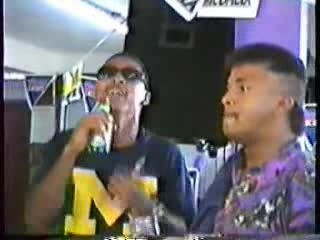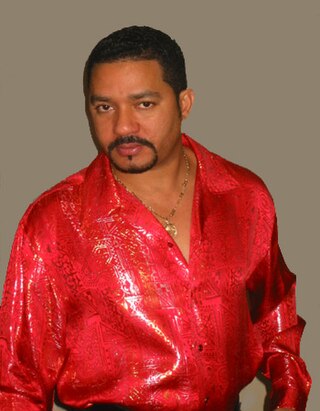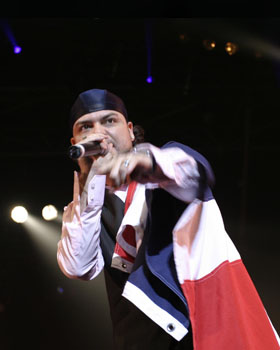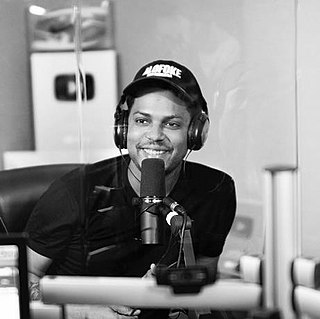
Reggaeton is a modern style of popular and electronic music that originated in Panama during the late 1980s, and which rose to prominence in the late 1990s and early 2000s through a plethora of Puerto Rican musicians. It has evolved from dancehall, with elements of hip hop, Latin American, and Caribbean music. Vocals include toasting/rapping and singing, typically in Spanish.

Raulín Marte Rodríguez is a Dominican bachata artist. He is one of the first major bachata artists to have international success. As a pioneer of the bachata genre, he helped grow the genre's popularity in the 1990s. While traditional bachata songs were often risque and suggestive, Raulín Rodríguez's idealized romantic lyrics widened the appeal of the genre of bachata, helping it get regular radio play. Rodriguez is known as "El Cacique" and is one of the most established musicians to ever come from the Dominican Republic. He has many international hits, including the songs: "Nereyda", "Medicina de Amor", "Soledad", Esta Noche, and many more. Three of them have been certified Platinum in the United States by the Recording Industry Association of America (RIAA).

Domingo Antonio Santos Muñoz, known professionally as Antony Santos, is a Dominican musician and singer. One of the top-selling bachata artists of all time, he is known as one of the pioneers of modern bachata in the early 1990s, with his role in redefining the genre to include romantic lyrics, poppy guitar licks, and implementation of new instruments, such as the piano and saxophone. He became the first rural bachatero to reach a mainstream audience with his hit single, "Voy Pa'lla". He has had success with other hits like "Por Mi Timidez", "No Te Puedo Olvidar", "Me Quiero Morir", "Lloro", "Solo Te Amo", "Se Acabó El Abuso", among others. Today, Santos is unanimously considered the greatest bachata artist of all time. He is known as "El Mayimbe" of Bachata, and is the second Dominican musician to acquire this moniker, after Fernando Villalona. He is also known as El Bachatú, the nickname he originally started with.
Miguel Ángel Valerio Lebrón, better known by his stage name Don Miguelo, is a Dominican rapper and singer. He became famous with his smash hit "La Cola De Motora" and he has twice been awarded with the Casandra Awards.

Frank Reyes is a Dominican singer. Known as the Prince of Bachata, he is regarded as one of the best known bachata artists of all time and famous throughout Latin America. He is a 7 time Bachata Artist of the Year winner at the Soberano Awards, making him the most awarded artist in that category. He is known for hits like "Vine a Decirte Adios", "Con el Amor No Se Juega", "Tu Eres Ajena", "Nada De Nada", "Quién Eres Tu", "Princesa", "Amor a Distancia", "Decidí", among others.
"Culpable" is a song by American singer Romeo Santos and Dominican rapper Lápiz Conciente. It is the eighteenth track of Santos' fifth studio album Formula, Vol. 3 (2022). The song uses the intrumentals from Luniz's I Got 5 On It. A teaser trailer for the music video was released on September 2, 2022, but the music video has not been released yet.

Robert José de León "Papi" Sánchez is a Dominican merengue rapper and singer. Initially, beginning his career as a Hip Hop MC, radio host and music director, considered as an important member of the early stage of the Dominican Hip Hop movement, Eventually found major success bleeding Rap, R&B and merengue music in mid-2000s.
Leonardo Michael Flores Ozuna, known by his stage name Monkey Black, was a singer of urban music from the Dominican Republic.

Emanuel Herrera Batista, known by his stage name El Alfa or El Alfa El Jefe, is a Dominican rapper, known as the King of Dembow. Batista was born in Bajos de Haina, Santo Domingo. He is known for his initial afro hairstyle which led him to popularity in the early 2010s through songs like "Tarzan", "Coche Bomba" and "Muevete Jevi". He went on to form good relationships with many artists from Puerto Rico, such as Nicky Jam, Farruko, and Myke Towers amongst others. This resulted in one of the biggest collaborations in dembow history, led by El Alfa, when he released "Suave (Remix)" in December 2018 alongside Chencho Corleone, Bryant Myers, Miky Woodz, Jon Z and Noriel.
Urbano music or Latin urban is a transnational umbrella category including many different genres and styles. As an umbrella term it includes a wide and diverse set of genres and styles such as dancehall, dembow, urban champeta, funk carioca, Latin hip hop and reggaeton. The commercial breakthrough of this music took place in 2017 with artists from Colombia, Cuba, the Dominican Republic, Panama, Puerto Rico, the United States, Venezuela and even non-Spanish-speaking nations, such as Brazil, where Portuguese is spoken.

El Hombre is the second studio album by dominican dembow artist El Alfa, released on November 2, 2018 by the independent label El Jefe Records. It contains 14 tracks of Dembow and Latin Trap and incorporates elements of dancehall, reggae, and hip-hop. It also includes remixes of the hits "Suave" and "Lo que yo diga". It features guest appearances from Cardi B, Anuel AA, Bryant Myers, Jon Z, Miky Woodz, Noriel, Plan B, Miky Woodz, Farruko, La Kikada, Mozart La Para & El Shick. The album was supported by the release of nine singles: "Mi Mami", "Pa Jamaica", "Con Silenciador", "Suave" (remix), "Sientate en ese deo", "Lo que yo diga" (remix), "Puñala de Carne" and "Uzi".

Disciplina is the debut studio album by Dominican urban artist El Alfa, released on August 11, 2017 by El Jefe Records. It contains 8 tracks of dembow and Latin Trap. It features guest verses from La Manta, Amenazzy, Bryant Mayers and La Manta. According to the artist, the title was chosen because perseverance is an essential part of success. It is his first studio album after a ten-year musical career.
Leury José Tejeda Brito, musically known as Chimbala, is a Dominican urban music rapper and singer from Santo Domingo.

Esmelin Santiago Matías García, known as Santiago Matías or Alofoke is a Dominican radio host and producer, record producer, celebrity interviewer, businessman and media mogul.

Tokischa Altagracia Peralta, known mononymously as Tokischa, is a Dominican rapper. After working for the renowned photographer Raymi Paulus, she was offered to enter the music industry. She signed a recording contract with Paulus Music and released his debut single "Pícala" to great regional success. In 2021 she expanded horizons, and was introduced to global artist. After her song "Linda" alongside Rosalía was released with great commercial success, she continued collaborating with artists such as J Balvin, Madonna, Anuel AA and Ozuna. Her lyrics mostly refer to sexual activity. Tokischa has often been catalogued as "controversial" by media outlets, with her music sparking controversy and receiving notable media coverage.

Contra el Tiempo is the debut album by the Dominican urban artist Don Miguelo, released on June 13, 2006, by JVN Music. All songs written or co-wrote by Don Miguelo, it contains 14 tracks of reggaeton and Latin urban with features guest appearances Domenic M, Monchy & Alexandra, Mary O'Nellon and Frank Reyes. The album was supported by the release of three official singles: "Ma'taide", "Acelearo & Pico", and the lead single "Que Tu Quieres " which was released in February 2005, was a national success inside the Dominican Republic and receiving exposure and attention by local media.

Formula, Vol. 3 is the fifth studio album by American singer Romeo Santos, released on September 1, 2022, by Sony Music Latin. It is the third installment of Santos' Formula trilogy following Formula, Vol. 1 (2011) and Formula, Vol. 2 (2014). Musically, it combines traditional bachata with innovative fusions exploring and experimenting dance, tropical house, hip hop and pop. It features several guest appearances by international stars such as Rosalía and Justin Timberlake. Also, it contains guest appearances by artists of his natal Dominican Republic such as Toño Rosario, Lápiz Conciente, Ramón Orlando, Luis Miguel del Amargue, Rubby Pérez, Fernando Villalona and Chris Lebron. The album contains 21 tracks, including 19 songs, one skit and an intro.

Ángel Rosario, known by his stage name Ángel Dior, is a Dominican rapper and singer. Rosario was born in 2003, Santo Domingo, Dominican Republic. He was awarded in the Heat Latin Music Awards and Premios Juventud in the categories; Best Dominican Urban Artist, and Best Dembow Collaboration. He has collaborated with Rauw Alejandro, Karol G, 6ix9ine, El Alfa, Chimbala and Bad Bunny.
Avelino Junior Figueroa Rodríguez, known musically as Lápiz Conciente, is a Dominican rapper. He is described as one of the pioneers of Hip hop in the Dominican Republic. In 2013 he was nominated at Premios Juventud, in the category (Favorite Urban Artist), in 2016 he was awarded at the Latin Music Italian Awards, and in 2017 he was nominated in the Latin Grammy Award for Best Urban Song, "Papa" in collaboration with Vico C.
Emmanuel Reyes, is a Dominican singer, songwriter and professional baseball pitcher. He was a pitcher in Major League Baseball (MLB) for the Toronto Blue Jays. In 2022 he participated in the television series The Voice Dominicana, and in 2019 he was a semi-finalist in the television series Dominicana's Got Talent.









